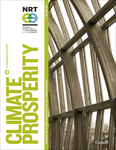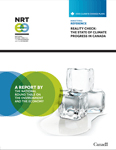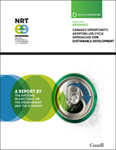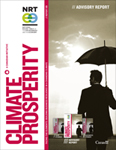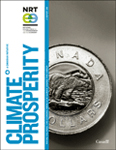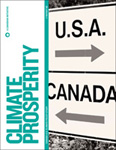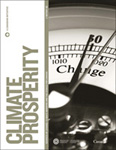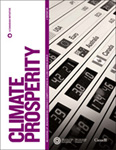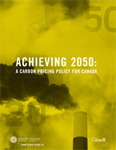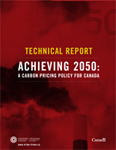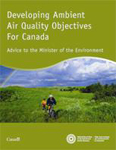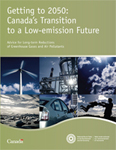News Release – January 13, 2009
Canada’s Commercial Building Sector Can Achieve Significant GHG Emission Reductions Through New Energy Efficiency Measures – NRTEE-SDTC Joint Report
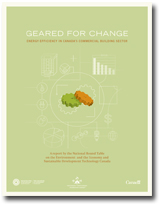 Ottawa, January 13, 2009 – Canada’s commercial building sector can contribute up to nearly 10% of total Canadian greenhouse gas (GHG) emission reductions in 2050 if a proposed policy pathway recommended by the National Round Table on the Environment and the Economy (NRTEE) and Sustainable Development Technology Canada (SDTC) is adopted.
Ottawa, January 13, 2009 – Canada’s commercial building sector can contribute up to nearly 10% of total Canadian greenhouse gas (GHG) emission reductions in 2050 if a proposed policy pathway recommended by the National Round Table on the Environment and the Economy (NRTEE) and Sustainable Development Technology Canada (SDTC) is adopted.
A joint report released today by the two organizations, entitled “Geared for Change: Energy Efficiency in Canada’s Commercial Building Sector”, shows that the combined application of an economy-wide carbon price signal, new regulations such as energy efficiency standards in building codes and minimum performance standards, targeted financial subsidies and incentives such as loan guarantees and accelerated capital cost allowances to promote technology deployment, and voluntary actions and information programs to promote energy efficiency, can together lead to a reduction of 73 MtCO2 per year compared to the business-as-usual scenario for the sector by 2050.
This represents an 89% reduction in emissions from the “do nothing” case, but is still 9% above 2008 levels. In order to achieve absolute emissions reductions from the sector after 2030 and to prevent a later rise in emissions, mandatory performance regulations will be necessary for all new buildings.
“This is an important economic sector that can make a real environmental contribution to addressing climate change by following the policy pathway our joint report sets out”, stated Bob Page, Chair of the NRTEE. “Every economic sector has to do its environmental share and this report provides specific solutions and recommendations on how new energy efficiency policies and measures in the commercial building sector can do just that.”
With more than 440,000 commercial buildings across Canada, the commercial building sector is a significant contributor to GHG emissions, representing 13% of total emissions. Given that the sector also represents 14% of all end-use energy consumption, the report concludes that a focus on energy efficiency will lead to real, measurable GHG emission reductions.
Addressing barriers to adoption of environmentally-friendly technologies necessary to combat climate change is a key conclusion of the report. “Strong policy is needed to pull through ready and waiting technology”, said Vicky Sharpe, President and CEO of SDTC. “Canada is a leader in developing clean technologies. Through specific funding and regulatory changes, the policy pathway laid out in our joint report will accelerate the adoption of these technologies, feeding the market demand that will emerge.”
“Geared for Change” marks the first collaborative research project of the NRTEE and SDTC, combining SDTC’s market and technology expertise with the NRTEE’s environmental and economic policy advisory mandate. NRTEE and SDTC have concluded that in order to achieve deep GHG emission reductions and to realistically determine climate change requirements by industry involving technology, having both national and sector-level plans are required.
“This is the first focused GHG emission reduction study of a major economic sector that uses original modeling and analysis to determine what specific steps need to be taken between now and 2050, and puts it all together in a comprehensive policy pathway for the federal government.” stated David McLaughlin, NRTEE President and CEO. “Our two sustainability organizations are providing a ready-made recipe for real emission reductions in the commercial building sector, beginning now.”
The report is based on almost a year of analysis and engagement with national and regional commercial building stakeholders and experts, plus the combined research, market, technology, and policy development strengths of the NRTEE and SDTC.
-30-
For more information or media inquiries contact:
Tony Bégin
NRTEE Communications Advisor
Tel: (613) 944-4781
begint@nrt-trn.ca
Patrice Breton
SDTC Director of Communications
Tel: (613) 234-6313 ext. 295
Mobile: (613) 292-5029
p.breton@sdtc.ca
About the NRTEE:
The National Round Table on the Environment and the Economy (NRTEE), an independent federal agency, is dedicated to exploring new opportunities to integrate environmental conservation and economic development, in order to sustain Canada’s prosperity and secure its future.
About SDTC:
Sustainable Development Technology Canada (SDTC) is an arms-length, not-for-profit corporation created by the Government of Canada that finances and supports the development and demonstration of clean technologies which provide solutions to issues of climate change, clean air, water quality and soil, and wh






